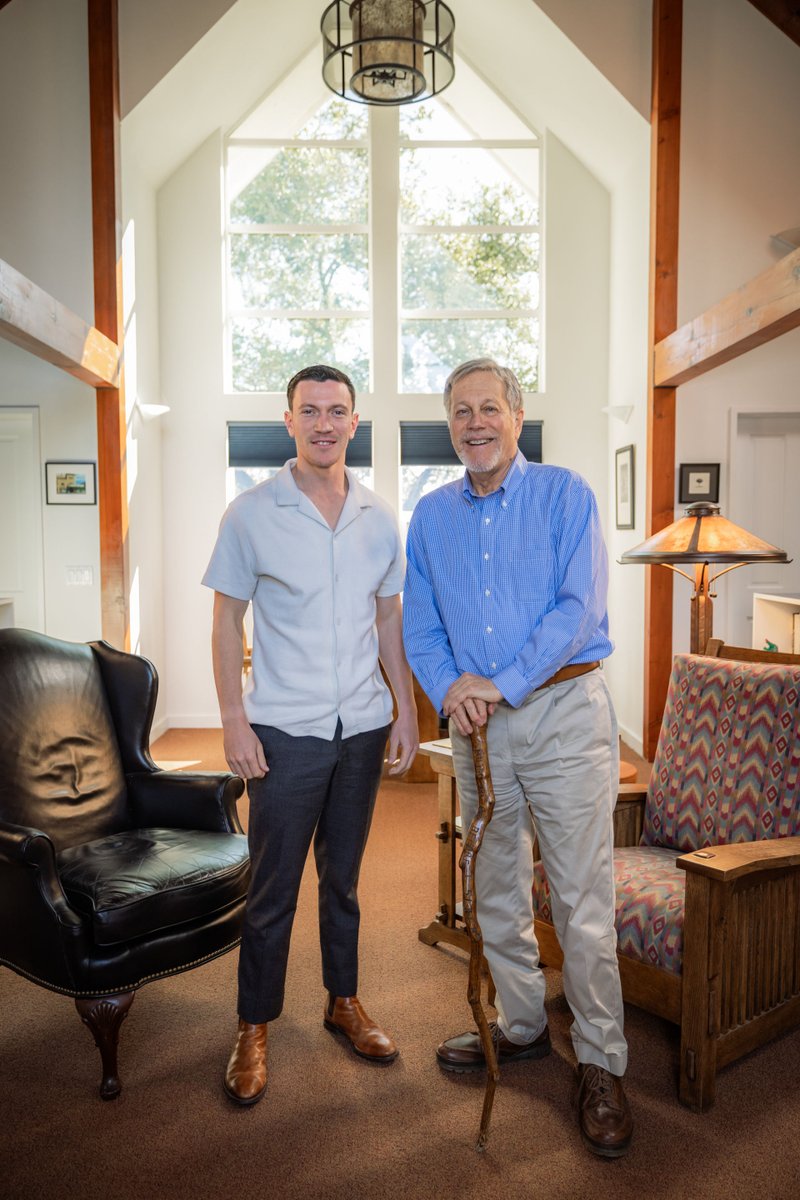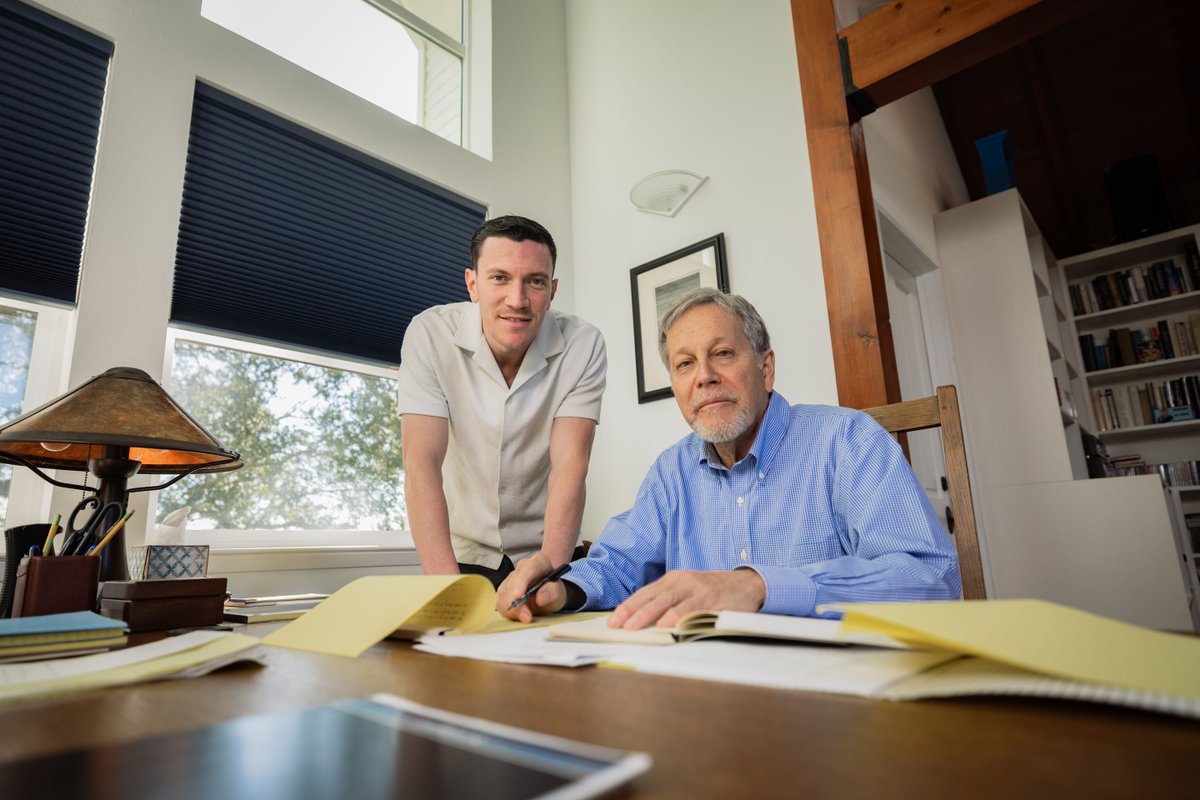With Jeff Bezos stepping down as CEO, here’s a thread of the best things I’ve learned from him.
1. Be willing to change your mind.
As Bezos famously said: "Anybody who doesn’t change their mind a lot is dramatically underestimating the complexity of the world we live in.”
1. Be willing to change your mind.
As Bezos famously said: "Anybody who doesn’t change their mind a lot is dramatically underestimating the complexity of the world we live in.”
2. There are two kinds of decisions.
One-way door decisions are irreversible, so make them slowly. Two-way door decisions are the opposite. Since you can go back on them, you should make them quickly.
One-way door decisions are irreversible, so make them slowly. Two-way door decisions are the opposite. Since you can go back on them, you should make them quickly.
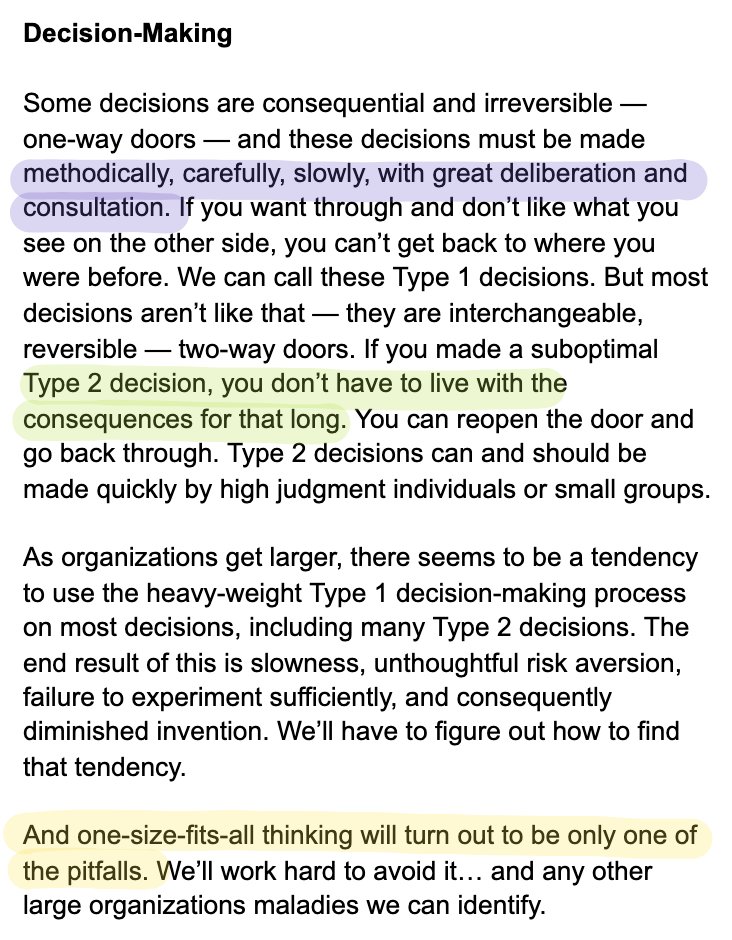
3. Encourage good writing
Amazon’s built a writing-first culture where employees review six-page memos at the start of important meetings. Writing takes longer in the short-term but saves time in the long-term. The memos are structured like a dissertation defense.
Here's how.
Amazon’s built a writing-first culture where employees review six-page memos at the start of important meetings. Writing takes longer in the short-term but saves time in the long-term. The memos are structured like a dissertation defense.
Here's how.
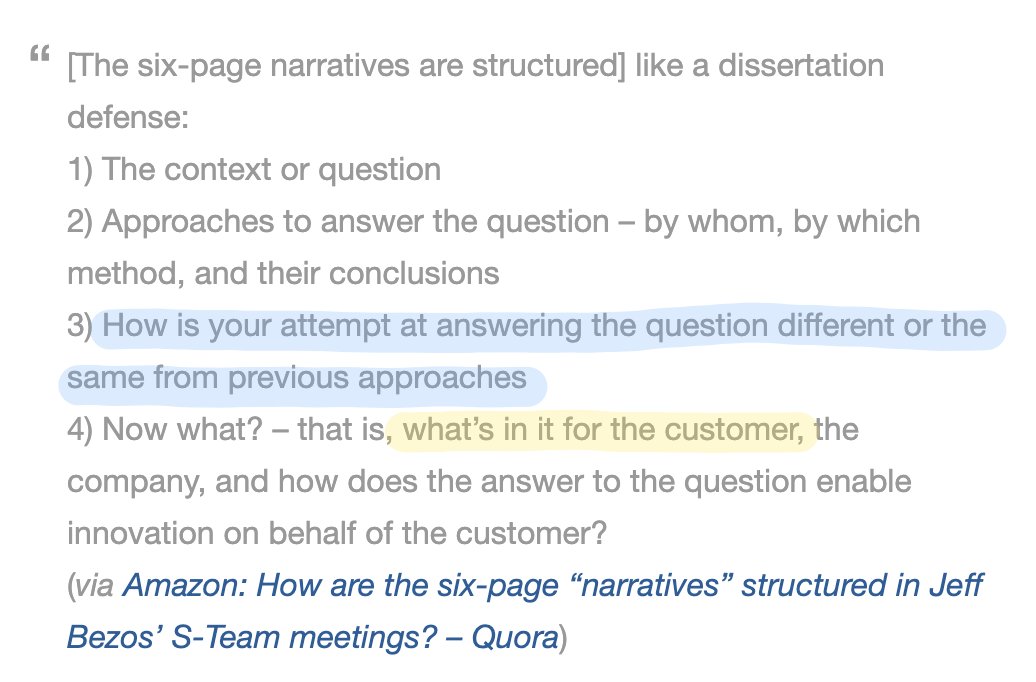
4. Think analytically
Bezos thought analytically about everything, even women. Early in his career, he took ballroom dance classes to increase his exposure to what he called n+ women. Later, he called this “women flow.”
Source: The Everything Store
Bezos thought analytically about everything, even women. Early in his career, he took ballroom dance classes to increase his exposure to what he called n+ women. Later, he called this “women flow.”
Source: The Everything Store
5. Balance the efficiency you need to execute with the wandering you need to innovate.
Here's Bezos.
Here's Bezos.
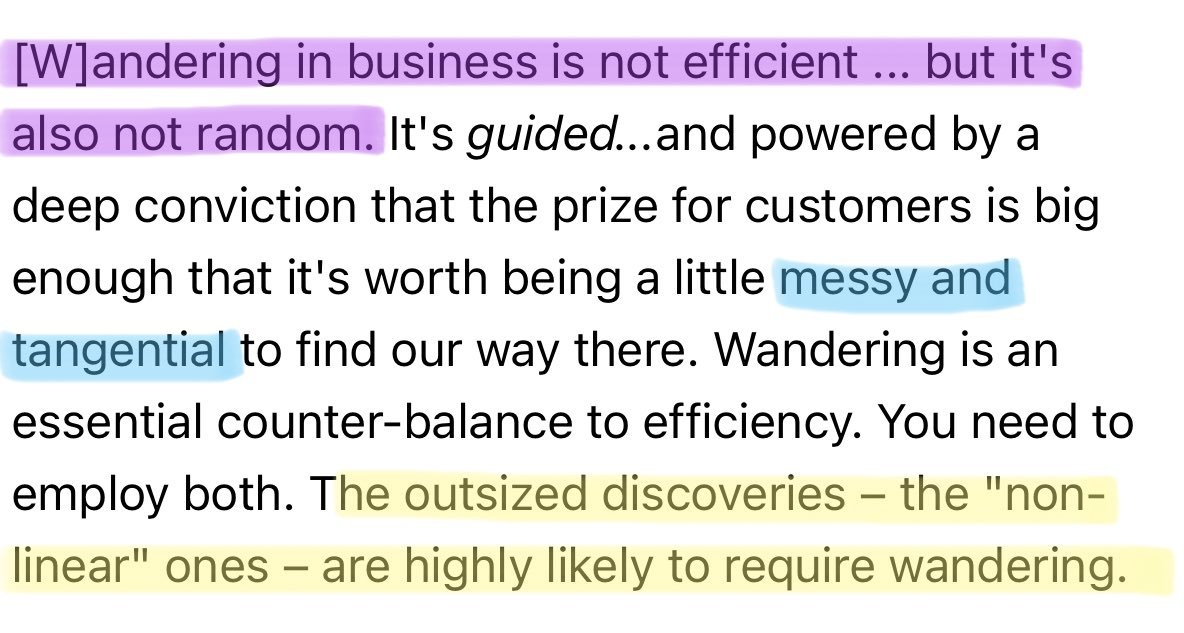
6. Jeff Bezos is a serious micro-manager
Source: The Steve Yegge Google Platforms rant which is one of the best things ever written about Amazon.
gist.github.com/chitchcock/128…
Source: The Steve Yegge Google Platforms rant which is one of the best things ever written about Amazon.
gist.github.com/chitchcock/128…
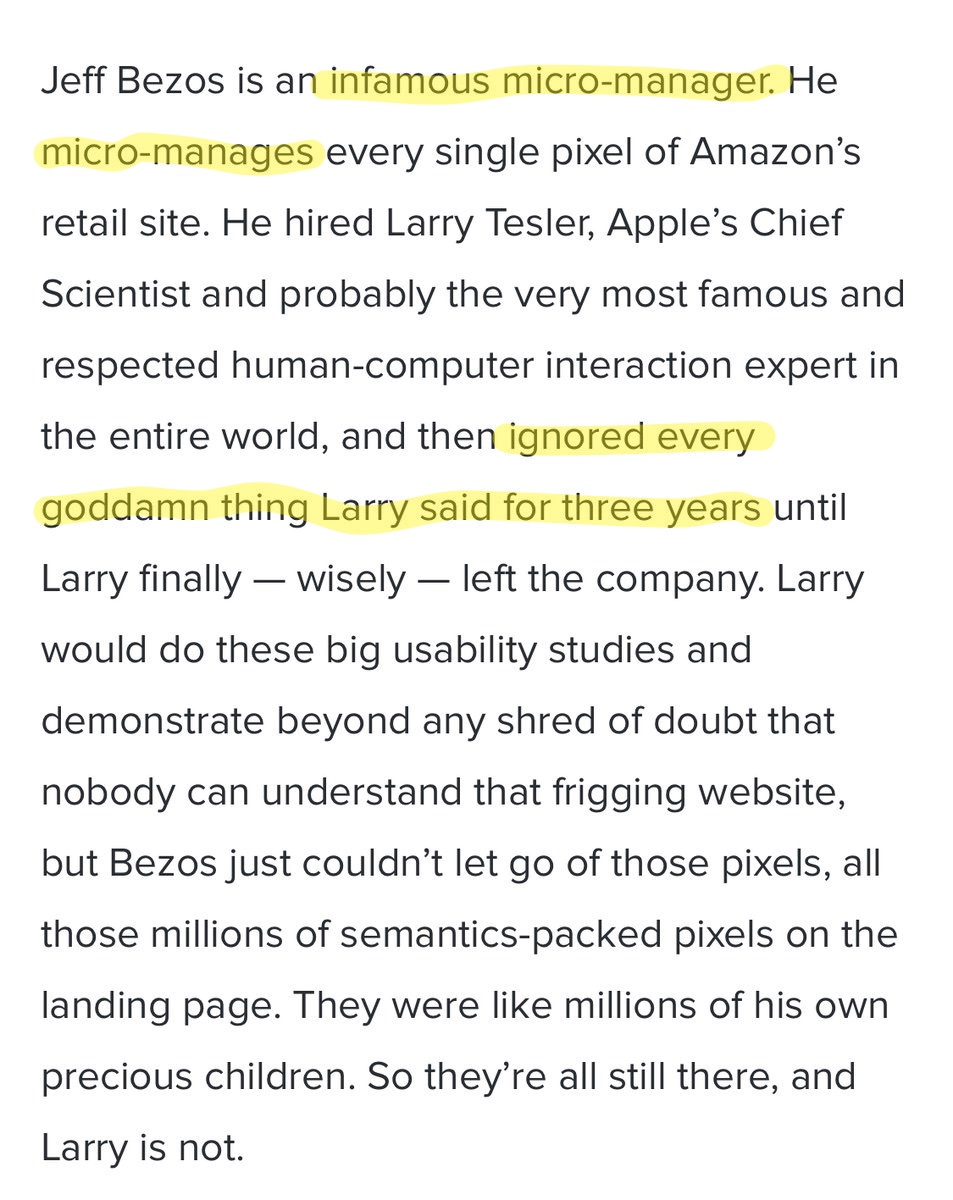
7. Keep things simple, even when your ideas are grand.
Amazon's principles are crisp and repeated often. That’s why he worked in an office building called “Day 1." True to his belief in simplicity, here's his rough original vision for Amazon Web Services.
Source: Steve Yegge
Amazon's principles are crisp and repeated often. That’s why he worked in an office building called “Day 1." True to his belief in simplicity, here's his rough original vision for Amazon Web Services.
Source: Steve Yegge
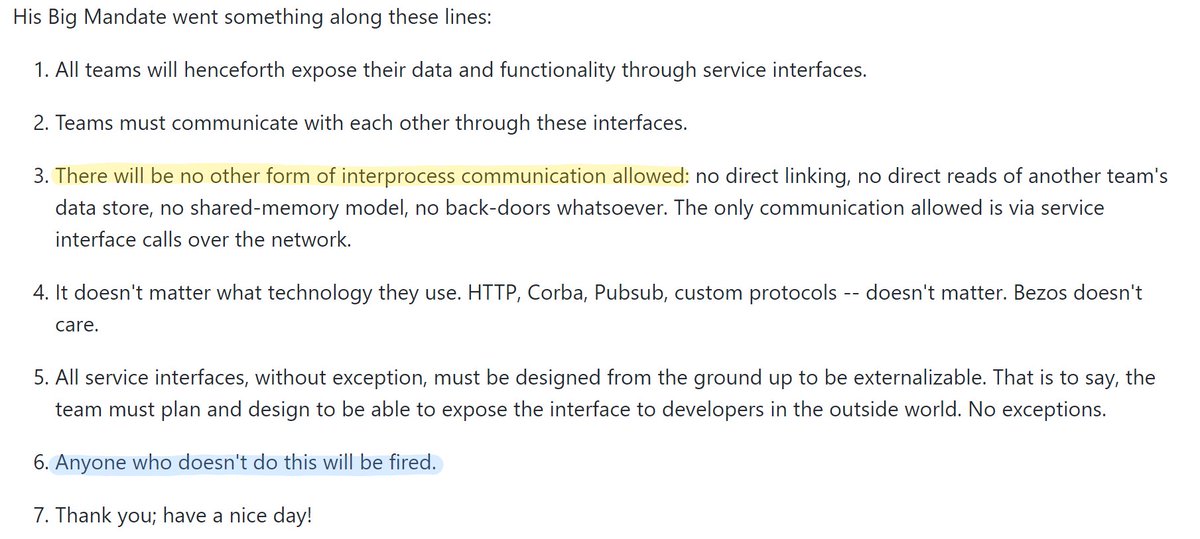
8. If you do something ambitious, smart people will doubt you.
In 1997, Jeff Bezos spoke to a group of students at Harvard Business School. Now, he says: "If you want to be innovative, you have to be willing to be misunderstood, and criticized.”
(h/t @awealthofcs)
In 1997, Jeff Bezos spoke to a group of students at Harvard Business School. Now, he says: "If you want to be innovative, you have to be willing to be misunderstood, and criticized.”
(h/t @awealthofcs)
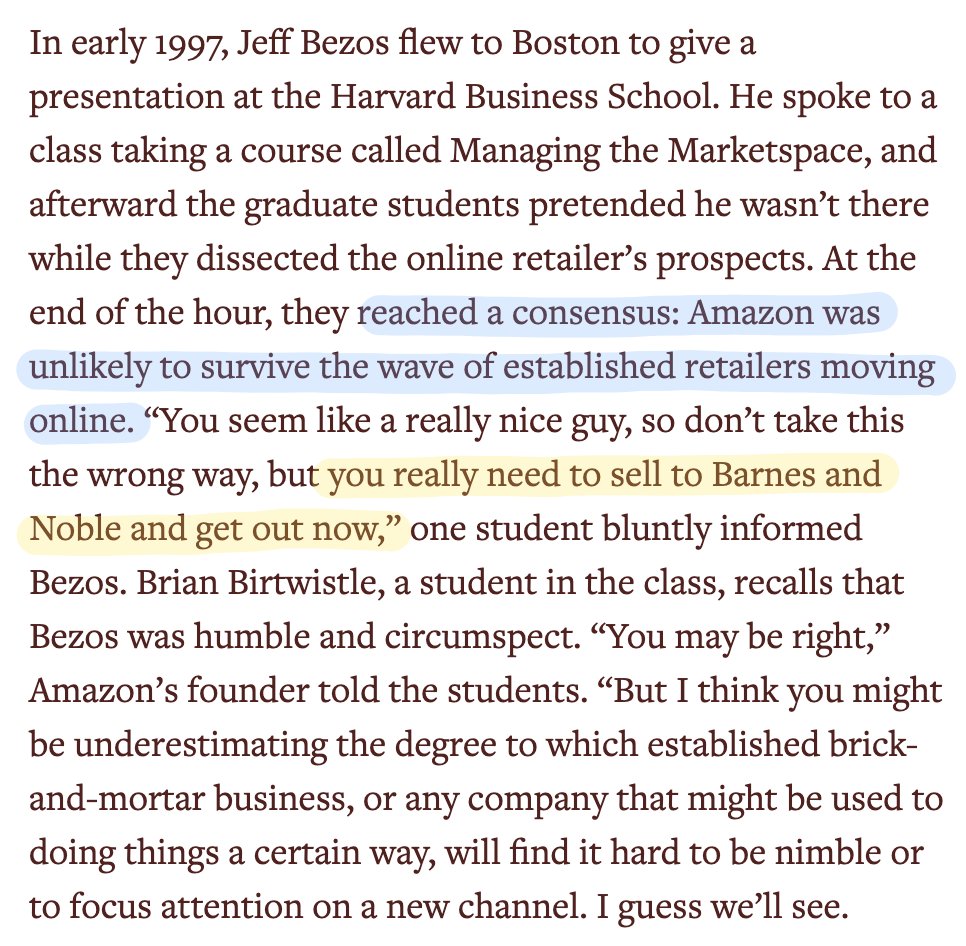
9. Find structural advantages
Barnes & Noble thought they could out-compete Amazon because they had deeper pockets. But because Amazon only charged sales tax in Nevada and Washington, Barnes & Nobel had to offer deeper discounts to compete on price.
Barnes & Noble thought they could out-compete Amazon because they had deeper pockets. But because Amazon only charged sales tax in Nevada and Washington, Barnes & Nobel had to offer deeper discounts to compete on price.
10. Be customer-driven
There are negative book reviews on Amazon — even though publishers haven't historically wanted them because of Bezos' empathy for customers. He said: “We don’t make money when we sell something. We make money when we help someone make a purchase decision.”
There are negative book reviews on Amazon — even though publishers haven't historically wanted them because of Bezos' empathy for customers. He said: “We don’t make money when we sell something. We make money when we help someone make a purchase decision.”
11. You will either fight to charge more or charge less.
Here's Bezos: “There are two kinds of retailers: there are those folks who work to figure how to charge more, and there are companies that work to figure how to charge less, and we are going to be the second, full-stop.”
Here's Bezos: “There are two kinds of retailers: there are those folks who work to figure how to charge more, and there are companies that work to figure how to charge less, and we are going to be the second, full-stop.”
12. Start the product development process by writing a press release.
By writing a press release for each new product, employees have to compress their pitch down to its essence. Then, work backward from the customer's perspective and public perception.
By writing a press release for each new product, employees have to compress their pitch down to its essence. Then, work backward from the customer's perspective and public perception.
https://twitter.com/david_perell/status/1213575415991881728?s=20
13. Bezos focused on three core advantages: customer-centricity, long-term thinking, and a genuine love for invention.
This Harry Potter story is my favorite example because it shows how Amazon was willing to lose money in exchange for customer loyalty.
perell.com/essay/amazon/
This Harry Potter story is my favorite example because it shows how Amazon was willing to lose money in exchange for customer loyalty.
perell.com/essay/amazon/
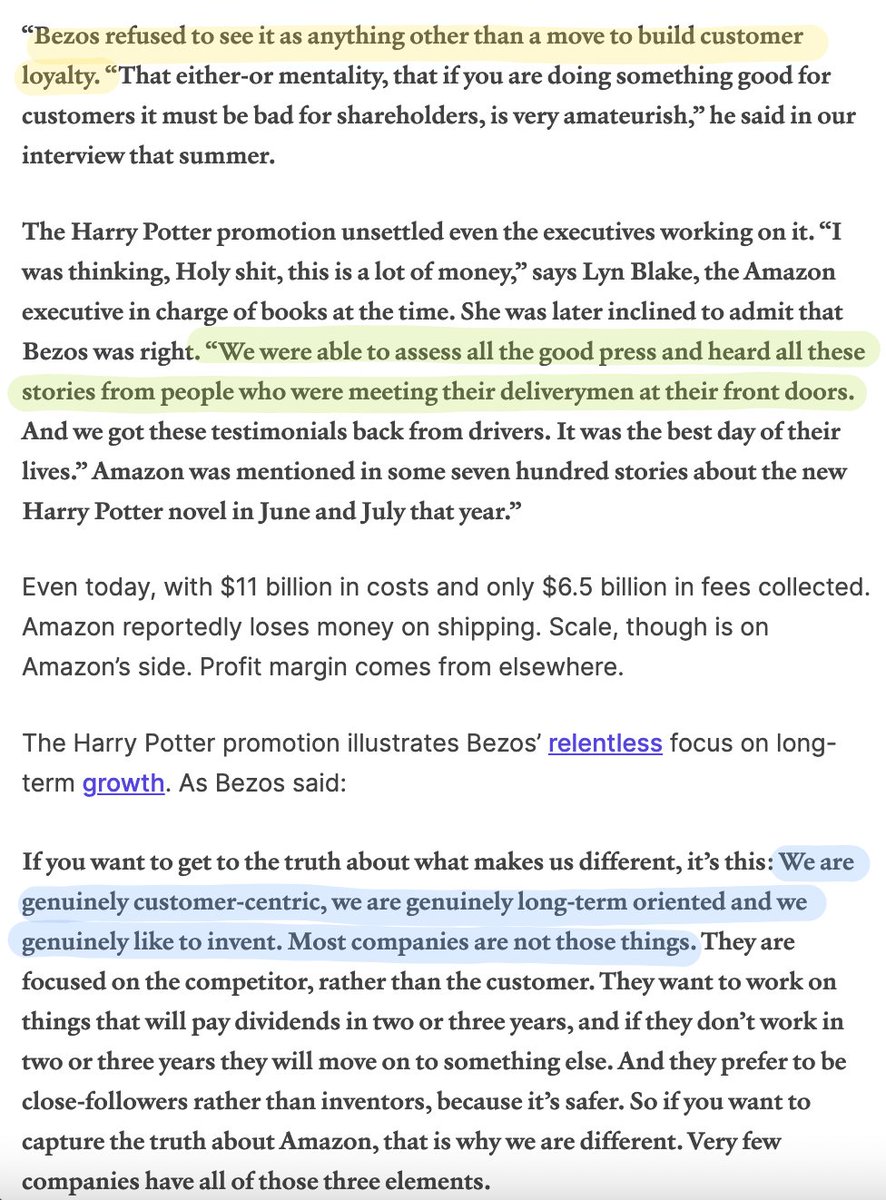
14. Build a flywheel
Jeff Bezos saw how flywheels could create compounding advantages for his company, long before they became common knowledge in the business world. Here's Amazon's flywheel in action, as drawn by @maxolson and explained by Bezos himself.

Jeff Bezos saw how flywheels could create compounding advantages for his company, long before they became common knowledge in the business world. Here's Amazon's flywheel in action, as drawn by @maxolson and explained by Bezos himself.

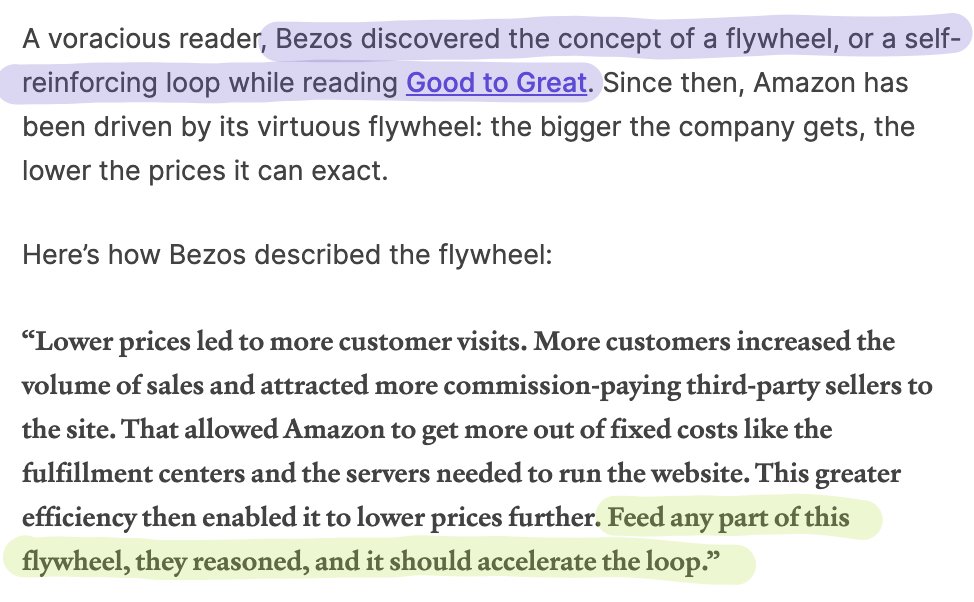
15. Follow a long-term vision, but know that things are going to change
“At Amazon, we like things to work in five to seven years. We’re willing to plant seeds, let them grow and we’re very stubborn. We say we’re stubborn on vision and flexible on details.”
(h/t @BalesFootball)
“At Amazon, we like things to work in five to seven years. We’re willing to plant seeds, let them grow and we’re very stubborn. We say we’re stubborn on vision and flexible on details.”
(h/t @BalesFootball)
16. Sometimes, the best way to predict the future is to bet on things that won't change.
In Amazon's case, Bezos knows that customers will still want fast delivery, vast selection, and low prices ten years from now.
In Amazon's case, Bezos knows that customers will still want fast delivery, vast selection, and low prices ten years from now.
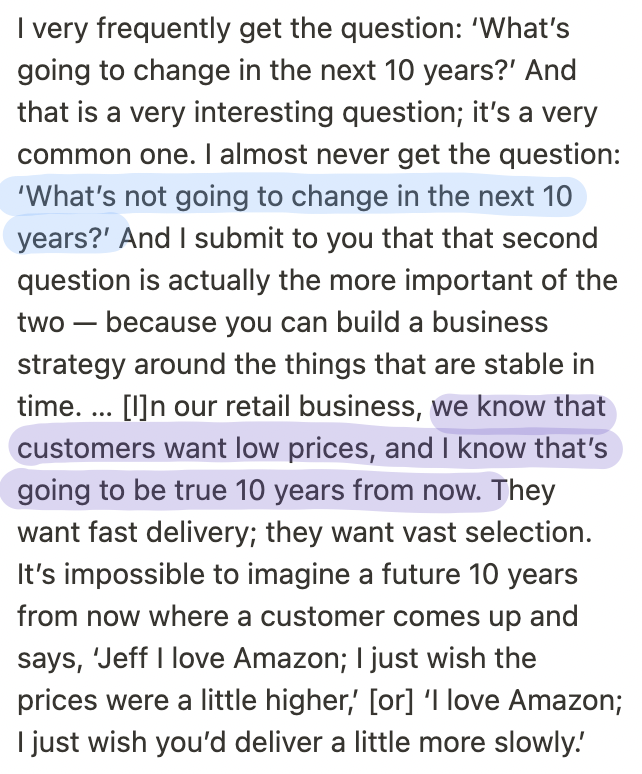
17. Consider the regret minimization framework for hard decisions
"You want to have minimized the number of regrets you have. That's what should drive people. Not how much money they have. It's regrets that I think haunt people at the end of their life."
"You want to have minimized the number of regrets you have. That's what should drive people. Not how much money they have. It's regrets that I think haunt people at the end of their life."
https://twitter.com/david_perell/status/1307845738437713920?s=20
18. When the right opportunity comes, it's okay to sacrifice the short-term for the long-term.
Understanding the nature of software economics (with high fixed costs and low marginal costs), shaped Bezos' strategy for Amazon Web Services.
(h/t @benthompson)

Understanding the nature of software economics (with high fixed costs and low marginal costs), shaped Bezos' strategy for Amazon Web Services.
(h/t @benthompson)


Brunello Cucinelli’s approach is the opposite of Amazon’s.
He's the founder of a $450 million fashion brand, which is valued at more than €1.6 billion.
Here’s how he built one of the largest clothing companies in the world.
He's the founder of a $450 million fashion brand, which is valued at more than €1.6 billion.
Here’s how he built one of the largest clothing companies in the world.
https://twitter.com/david_perell/status/1315426534900092929
• • •
Missing some Tweet in this thread? You can try to
force a refresh






